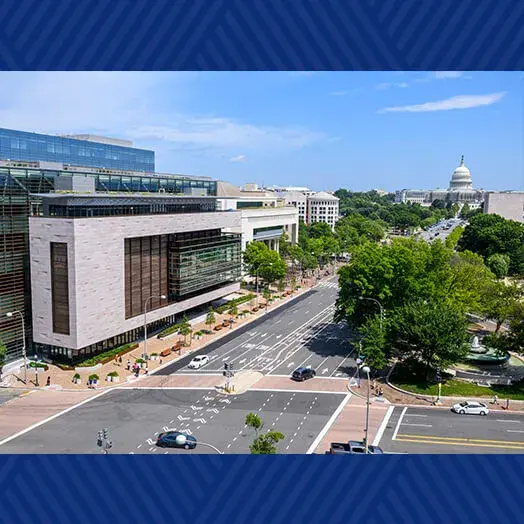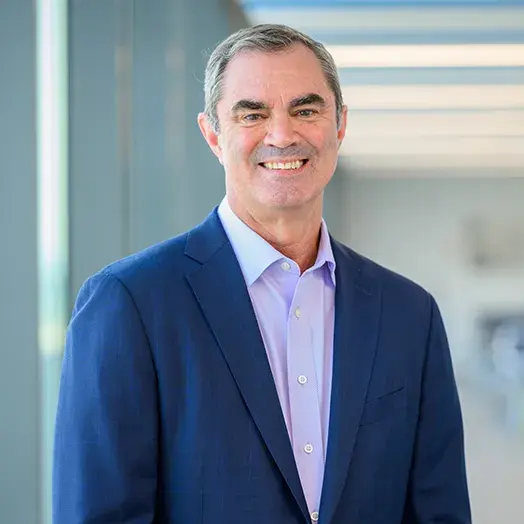The Carey Business School will offer its Full-time MBA program and a new hybrid Executive MBA at the Johns Hopkins University Bloomberg Center while building on its offerings in Baltimore.

The Johns Hopkins MBA expands to Washington, D.C., launches new programs
Editor’s note: Since the date of this publication, Carey Business School has decided to keep its Full-time MBA program in Baltimore.
Media inquiry: Carey.communications@jhu.edu
Responding to the demands of the modern business environment, the Johns Hopkins Carey Business School is expanding its Full-time MBA program to the Johns Hopkins University Bloomberg Center in Washington, D.C., beginning in fall 2026, bringing business of health expertise, a tech-focused approach to what’s next in business, and an award-winning experiential learning curriculum to benefit degree-seekers and businesses alike.
Carey will also be launching a new Executive MBA program in Washington, D.C.
A leader in dual-degree graduate education, the school is adding to its Baltimore location a full-time dual PhD/MBA with the Bloomberg School of Public Health and its new Accelerated MBA program for current Johns Hopkins University graduate-level students or recent alumni who want to add a business degree to their graduate credentials. Carey’s dozen existing MBA dual degrees include six business of health programs, two in government or international relations, one in communication, one in design leadership, one in applied economics, and one in law.
Additionally, Carey will offer a new Master of Science in Management, or MiM, in Baltimore.
“Our job is to set our students up for success, and one important way we can do that is to offer them learning environments that spark their passion and curiosity and offer opportunity for success after graduation,” said Carey Dean Alex Triantis.
A booming business of health
The Carey Business School, grounded in the Hopkins legacy of innovating health care, is an unparalleled leader in the business of health; 33% of Carey’s 2024 Full-time MBA graduates are pursuing careers in health care and more than 25% of its faculty are engaged in health-related research. Its Full-time MBA features a Health, Technology, and Innovation specialization; its Executive MBA, or EMBA, will feature a health care specialization; and its Executive Education offerings will include a new Academy for Transformative Health Care Leadership in partnership with the Johns Hopkins School of Medicine, launching in January 2026.
In addition to the long-established global influence of Hopkins’ health expertise in Baltimore, Carey Business School is uniquely positioned to help the D.C. region meet a clear and increasing demand for talent in the health care sector. Health care now makes up the second-largest group of private employers in the district, and in April 2025, the education and health care supersector led all private industry job gains, driven primarily by growth in health care and social assistance. This surge underscores a critical need for professionals who understand both the clinical and business dimensions of health.
Tech fuels future business
As one of the first business schools to include artificial intelligence as an integrated part of its STEM-based MBA curriculum, Carey continues to lead in preparing its students for the impact of innovation and technology on business, mirroring the university's broader quest to advance and optimize data science capabilities.
“We started integrating AI in our curriculum back in 2019, ahead of other business schools and well before ChatGPT started making headlines, because we knew the future of business and society would depend on it,” said Tinglong Dai, the Bernard T. Ferrari Professor at the Carey Business School.
This past spring, some Carey students had the opportunity to work with leading tech company Siemens and cloud-based software company Salesforce, putting their business acumen to the test with hands-on experience in the tech sector.
Aimed at professionals with a decade of experience, the hybrid Executive MBA, with in-person residencies in Washington, D.C. totaling two months over the course of the 15-month program, will include AI integration throughout its curriculum so that it prepares today’s leaders for the ways AI will influence their industries and services now and in the future.
“Our students learn how to use AI ethically and responsibly, not just technically,” said Dai. “They are building startups, shaping policy, and reimagining industries. They are not just prepared for the future. They are already shaping it.”
Standout experiential learning partnerships
In addition to meeting prospective students’ interests, Carey’s programs benefit regional business, opening channels for hiring, internships, partnerships, and mutually beneficial experiential learning that puts Carey students to work for firms through Carey’s experiential immersions, courses and electives—a portfolio that has won awards from expert business education organizations for its innovation. For example, Carey students work in collaboration with firms in offerings like the Innovation Field Project, an eight-week intensive that turns student teams into consultants, providing recommendations and implementable solutions to firms’ immediate business challenges. Leading employers like AstraZeneca, Medstar Health, the International Monetary Fund, and the federal Office of Veterans Affairs have benefited from this project.
“The Carey Business School is growing globally, building on our commitment to Baltimore while we expand access to world-class business education,” said Triantis. “It will benefit our students and employers, and it’s an exciting position to be in as we near our 20th year.”


